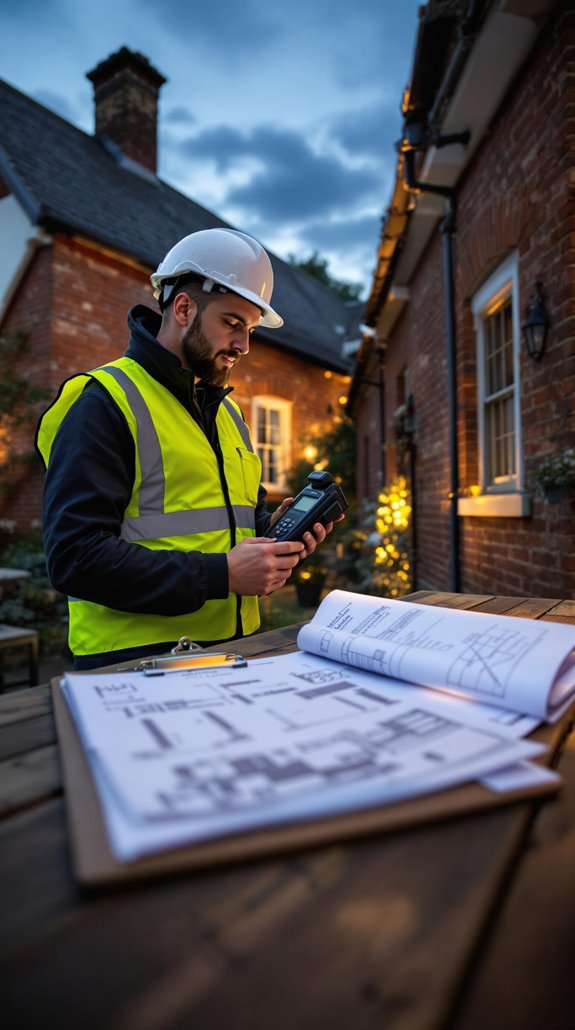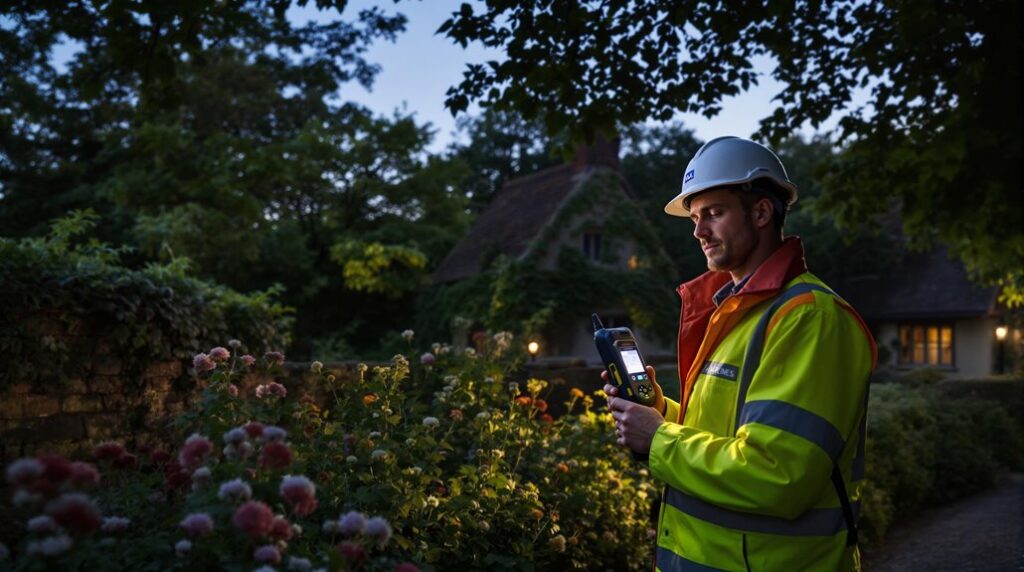I’ll break down the real costs you’re facing for bat surveys in the UK, because I’ve seen too many property developers get caught off-guard by unexpected fees and seasonal delays. The pricing isn’t straightforward—it depends on your property size, survey complexity, and timing requirements that can make or break your planning application. Before you commit to any ecological consultant, there are specific cost factors and legal obligations you need to understand to avoid costly mistakes.
Key Takeaways
- Preliminary Roost Assessment (PRA) costs £299-£500 nationwide, serving as the initial survey to determine bat presence potential.
- Phase 2 emergence surveys range from £750-£1,500+, with combined PRA and Phase 2 surveys typically costing £1,000+ minimum.
- Survey costs increase significantly based on property size, site accessibility, equipment needs, and survey complexity requirements.
- Bat activity surveys must occur between May-August, requiring early booking to secure slots before September deadlines.
- All UK bat species are legally protected, making qualified ecological consultants essential for planning authority compliance.
Factors That Determine Bat Survey Pricing

When planning a bat survey, several interconnected factors will greatly impact your final bill. I’ll break down what drives these costs so you’re prepared.
Survey complexity tops the list—Phase 2 emergence surveys cost considerably more than basic roost assessments. If surveyors need thermal cameras or specialized bat detectors, expect higher fees. Your property size matters too; larger buildings and multi-structure developments require more time and resources.
Site accessibility dramatically affects pricing. Difficult terrain, restricted access points, or unstable structures increase safety requirements and specialized equipment needs. Remote locations add travel and accommodation expenses.
Seasonal timing creates additional costs—active bat season surveys (April-September) often require multiple dusk visits. Additionally, accurate quotes can be obtained from trusted local ecologists who understand your specific project requirements. Finally, your surveyor’s expertise, location, and licensing credentials influence rates, with specialist qualifications commanding premium pricing.
Understanding Typical Cost Ranges for Bat Surveys
Now that you understand what drives bat survey costs, let me break down the actual price ranges you’ll encounter. A Preliminary Roost Assessment (PRA) typically costs £500 nationwide, though in Cornwall you’ll find ranges from £300-£500. Some surveyors won’t charge VAT, which helps your budget.
If your PRA indicates potential bat presence, you’ll need a Phase 2 emergence survey costing around £900, with ranges from £750-£1,500+ depending on complexity. This requires multiple dusk visits during April-September using specialized equipment.
For combined PRA and Phase 2 surveys, expect £1,000+ minimum. Complex properties with mitigation design can escalate to several thousand pounds. I always recommend getting multiple quotes since property size, location, and timing greatly impact final costs. Your survey report will be provided on the same day as the survey completion.
Different Survey Types and Their Associated Costs

While bat surveys share common objectives, each survey type carries distinct costs and requirements that directly impact your project budget. I’ll break down the two main survey types you’ll encounter.
The Preliminary Roost Assessment (PRA) costs £299–£500 and serves as your initial gateway. This single-day survey by a licensed ecologist determines whether you’ll need further investigation. If you’re fortunate and receive a low bat potential rating, you’ll avoid the more expensive Phase 2 surveys entirely—saving you 40–60% on total costs.
Emergence/Re-Entry Surveys (Phase 2) represent the significant investment at £789–£3,000+. These require multiple surveyors conducting dusk/dawn visits over 2–3 days, but they’re only necessary when your PRA indicates moderate-to-high bat potential. All surveys must follow Good Practice Guidelines to ensure legitimacy and acceptance by local authorities.
Timing Requirements and Seasonal Considerations
Understanding your project’s timing constraints can make or break your budget—and potentially delay your development by an entire year. I’ll help you navigate these critical windows to avoid costly mistakes.
Activity surveys—your primary concern—must occur between May and August, with possible September extensions in favorable weather. Miss this window, and you’re waiting until next year, watching holding costs pile up. The good news? Initial scoping surveys can happen year-round, so I recommend starting these immediately.
Weather and location affect your survey windows too. Northern sites have shorter active seasons than southern locations, and temperature fluctuations can compress your available timeframe. Smart developers book surveys early in the season, securing their slot before the September deadline approaches. Winter hibernation surveys may be required if summer activity surveys detect bat presence at your site.
Legal Requirements and Planning Permission Necessities

Before you even think about development costs, you’re legally bound to protect bats—and ignoring this obligation will cost you far more than any survey. All 17 UK bat species are protected under the Wildlife and Countryside Act and Conservation of Habitats and Species Regulations. Harming bats or destroying roosts, even unoccupied ones, is a criminal offence.
Your Local Planning Authority can’t legally approve applications without considering bat impacts due to Section 40 of the Natural Environment and Rural Communities Act. They’ll request surveys where there’s reasonable likelihood of bats being present. Don’t worry—bat presence doesn’t usually prevent development, but you’ll need qualified ecological consultants and proper mitigation measures. The upfront survey cost protects you from prosecution and project delays.
Local authorities take different approaches when requesting bat surveys, with some using standardized checklists while others mandate preliminary roost assessments for any roof-affecting applications.
Getting Quotes and Choosing the Right Survey Provider
With legal obligations firmly established, you’ll need to secure qualified professionals who can deliver compliant surveys without breaking your budget. I recommend obtaining at least three written quotations to compare scope and pricing effectively. Always confirm whether quotes include VAT, as many providers exclude it from initial estimates.
When evaluating providers, prioritize licensed ecologists with Natural England certification and professional body memberships. I suggest reviewing sample reports to assess their compliance standards and detail quality. Make sure quotes explicitly cover all required phases—PRA, dusk/dawn surveys, and mitigation planning—as these greatly impact final costs.
Request fixed-price breakdowns with itemized travel expenses and reporting timelines. Don’t accept unsupervised surveys; verify direct ecologist involvement throughout the process to guarantee your investment delivers planning-compliant results. Be aware that ecological reports typically have expiration dates of around 2 years, which may require refresh surveys depending on your planning timeline.
Conclusion
I’ve covered the key cost factors you’ll need to budget for when planning your bat survey. Remember that rushing into the cheapest option often backfires – you’ll want qualified consultants who won’t miss critical details that could delay your planning permission. I’d recommend getting three quotes minimum, booking during peak season (May-August), and factoring in potential follow-up surveys. Proper planning now saves you significant costs and delays later.
References
- https://acp-consultants.com/bat-survey/
- https://collingtonwinter.com/blog/bat-survey-cost-and-guidance/
- https://arbtech.co.uk/protected-species/bat-surveys/scoping-bat-survey/
- https://bat-surveyor.co.uk/bat-survey-faq/
- https://www.ecologybydesign.co.uk/protected-species-survey/bat-survey
- https://www.checkatrade.com/blog/cost-guides/bat-survey-cost/
- https://www.marraum.co.uk/blog/do-i-need-a-bat-survey-for-planning
- https://arbtech.co.uk/protected-species/bat-surveys/
- https://www.homebuilding.co.uk/advice/bat-surveys
- https://cieem.net/wp-content/uploads/2019/02/Bat_Survey_Guidlines_for_UK_Home_Owners.pdf

